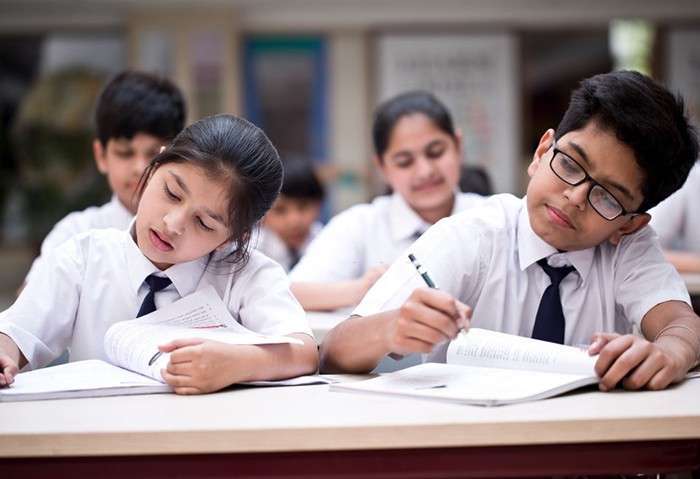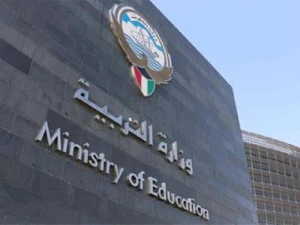Latest News
- 5 Deported Bangladeshis Arrested For Illegal Entry
- Kuwait's Largest Liquor Factory Raided, Four Arrested
- 40,000 Kuwaitis Traveled To Oman In 2023; Tourism Increases
- MoE Rolls Out An Advanced Mobile App
- The Population Growth In Kuwait Raises Economic Concerns
- Jobless Kuwaitis Number Expected To Rise - CSC Blamed For Chaos
- Temporary Closure Of The Kuwait City Tunnel
- DGCA Recorded 1.1m April Travelers
- Bedouns Are Reminded To Obey Laws By Kuwait
- Heavy Fines And Deportation For Unauthorized Hajj Pilgrimage Imp...
- New Advertising Rules In Kuwait Slash Violations In Four Months
- Municipality Issued 86 Warnings For Vision Obstruction In Mubara...
New Education Policy 2020: Early Childhood Care And Education – The Foundation Of Learning

The Eighty-sixth Amendment to the Constitution of India in 2002 installed Article 21-A, which envisages free and compulsory education for all children in the age group of six to fourteen years as a Fundamental Right. To make it an augmented reality the New Education Policy 2020 (NEP-2020) envisions that ‘every child in the age range of 3-6 years has access to free, safe, high quality, developmentally appropriate care and education by 2025.
The learning process for a child commences immediately at birth, with evidence from neuroscience showing that over 85 percent of a child’s cumulative brain development occurs prior to the age of 6. This indicates the critical importance of appropriate care and stimulation of the brain in a child’s early years to promote sustained and healthy brain development and growth.
Indeed, analysis of brain scans of children who encountered various levels of neglect or deprivation in their early years revealed unfortunate deficiencies in the development of critical areas of the brain, and corresponding adverse effects on cognitive and emotional processing. Excellent care, nurture, nutrition, physical activity, psycho-social environment, and cognitive and emotional stimulation during a child’s first six years are thus considered extremely critical for ensuring proper brain development and, consequently, desired learning curves over a person’s lifetime.
A study conducted by the National Council of Educational Research and Training (NCERT) titled ‘The impact of pre-school education on retention in primary grades’ (1992) on 30,000 children illustrated strong and direct correlations between exposure to pre-school education and retention rates. Various global studies have also revealed longer-term impacts. Quality pre-school education is strongly correlated with higher incomes and rates of home ownership, and lower rates of unemployment, crime, and arrest.
In terms of the growth of the national economy, it has been proposed that the development of a strong Early Childhood Care and Education (ECCE) program is among the very best investments that India can make, with an estimated 10 times return on investment. In summary, it is recognized that investment in ECCE gives the best chance for children to grow up into good, moral, thoughtful, creative, empathetic, and productive human beings.
Studies tracking student learning outcomes clearly demonstrate that children who start late tend to stay behind throughout their school years. This tragic deficiency in formal school-preparedness is particularly marked between advantaged and disadvantaged groups. This is because students from more advantaged families have greater access to role models, print awareness, language fluency in the school language, and strong learning environments at home, in addition to better nutrition, healthcare, and of course access to pre-school education.
ECCE is perhaps the greatest and most powerful equalizer for all these reasons — from brain development to school-preparedness, improved learning outcomes, equality and justice, employability, and the prosperity and economic growth of the country – India absolutely must invest in accessible and quality ECCE for all children.
The latest research in ECCE shows that children under the age of 8 adapt to more pre-scripted learning. Therefore, it is important that children of ages 3-8 have access to a flexible, multifaceted, multilevel, play-based, activity-based, and discovery-based education. It also becomes natural then to view this period, from three years of pre-school (ages 3-6) to the end of Grade 2 (age 8), as a single pedagogical unit called the ‘Foundational Stage’. It is necessary, therefore, to develop and establish such an integrated foundational curricular and pedagogical framework, and corresponding teacher preparation, for this critical foundational stage of a child’s development.
At the current time, most early childhood education is delivered in the form of Anganwadis and private pre-schools, with a very small proportion coming from pre-schools run by NGOs and other organizations. These feeder pre-primary schools lack trained pre-primary teachers, proper infrastructure and usually focus on rote learning and have high pupil-teacher ratio.
The NEP therefore focuses on developing an excellent curricular and pedagogical framework for early childhood education by NCERT in accordance with the above guidelines, which would be delivered through a significantly expanded and strengthened system of early childhood educational institutions, consisting of Anganwadis, pre-primary schools/sections co-located with existing primary schools, and stand-alone pre-schools, all of which will employ workers/teachers specially trained in the curriculum and pedagogy of ECCE.
The numerous rich traditions of India over millennia in ECCE, involving art, stories, poetry, songs, gatherings of relatives, and more, that exist throughout India must also be incorporated in the curricular and pedagogical framework of ECCE to impart a sense of local relevance, enjoyment, excitement, culture, and sense of identity and community. The NEP commends the traditional roles of families in raising, nurturing, and educating children. In particular, family-leave policies that afford women and men the ability to tend to their children in their earliest years of life and are critical in enabling families to fulfil these traditional roles, have also been recommended by NEP.
Providing quality ECCE: During the ages prior to 3 years, quality ECCE includes the health and nutrition of both the mother and the child, but also crucially includes cognitive and emotional stimulation of the infant through talking, playing, moving, listening to music and sounds, and stimulating all the other senses particularly sight and touch. Exposure to languages, numbers, and simple problem-solving is also considered important during this period.
From 3 to 6 years of age, ECCE includes continued healthcare and nutrition, but also crucially self-help skills, such as ‘getting ready on one’s own’, motor skills, cleanliness, the handling of separation anxiety, being comfortable around one’s peers, moral development,such as knowing the difference between ‘right’ and ‘wrong’, physical development through movement and exercise, expressing and communicating thoughts and feelings to parents and others, sitting for longer periods of time to work on and complete a task, and generally forming all-round good habits.
Supervised play-based education, in groups and individually, is considered particularly important during this age range to naturally build up the child’s innate abilities and all-important lifelong skills of cooperation, teamwork, social interaction, compassion, equity, inclusiveness, communication, cultural appreciation, playfulness, curiosity, creativity, as well as the ability to successfully and respectfully interact with teachers, fellow students, staff, and others. ECCE during these years also entails learning about alphabet, languages, numbers, counting, colors, shapes, drawing/painting, indoor and outdoor play, puzzles and logical thinking, visual art, craft, drama, puppetry, music, and movement.
I will continue on this vast area of education ‘Early Childhood care and Education’ In the next issue.
SOURCE : TIMES KUWAIT
Trending News
-
 AstraZeneca Admits Covid Vaccine Can Cause Rare Si...
29 April 2024
AstraZeneca Admits Covid Vaccine Can Cause Rare Si...
29 April 2024 -
 Work Permits Will Be Issued For One Year Under The...
27 April 2024
Work Permits Will Be Issued For One Year Under The...
27 April 2024 -
 Kuwait Unveils Monumental Solar Energy Project For...
06 May 2024
Kuwait Unveils Monumental Solar Energy Project For...
06 May 2024 -
 Ministry Of Health Amend 'nature Of Work' Allowanc...
28 April 2024
Ministry Of Health Amend 'nature Of Work' Allowanc...
28 April 2024 -
 Gulf Electrical Interconnection Project Will Boost...
04 May 2024
Gulf Electrical Interconnection Project Will Boost...
04 May 2024 -
 In 3 Months, Kuwaitis And Expats Bought 4 Tons Of...
01 May 2024
In 3 Months, Kuwaitis And Expats Bought 4 Tons Of...
01 May 2024 -
 Kuwait Banks Seek Clarity From Central Bank On Cit...
04 May 2024
Kuwait Banks Seek Clarity From Central Bank On Cit...
04 May 2024 -
 Kuwait Cracks Down On Bachelors
02 May 2024
Kuwait Cracks Down On Bachelors
02 May 2024 -
 Expat Deported For Inciting Child Murder
28 April 2024
Expat Deported For Inciting Child Murder
28 April 2024 -
 Kuwait Organizes 30 Events To Protect Children Fro...
04 May 2024
Kuwait Organizes 30 Events To Protect Children Fro...
04 May 2024












Comments Post Comment